|
|
|
Sort Order |
|
|
|
Items / Page
|
|
|
|
|
|
|
| Srl | Item |
| 1 |
ID:
191955
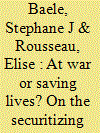

|
|
|
|
|
| Summary/Abstract |
This paper offers a multi-dimensional analysis of the ways and extent to which the US president and UK prime minister have securitized the Covid-19 pandemic in their public speeches. This assessment rests on, and illustrates the merits of, both an overdue theoretical consolidation of Securitization Theory’s (ST) conceptualization of securitizing language, and a new methodological blueprint for the study of ‘securitizing semantic repertoire’. Comparing and contrasting the two leaders’ respective securitizing semantic repertoires adopted in the early months of the coronavirus outbreak shows that securitizing language, while very limited, has been more intense in the UK, whose repertoire was structured by a biopolitical imperative to ‘save lives’ in contrast to the US repertoire centred on the ‘war’ metaphor.
|
|
|
|
|
|
|
|
|
|
|
|
|
|
|
|
| 2 |
ID:
191958
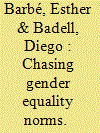

|
|
|
|
|
| Summary/Abstract |
This article studies Sexual and Reproductive Health and Rights (SRHR) at the United Nations (UN). SRHR, a gender equality norm that applies human rights to sexuality and reproduction, have traditionally been supported by a network of actors led by the United States (US) and the European Union. Nevertheless, a rival network has contested SRHR since their conception in the early 1990s. We study the robustness of SRHR in five UN fora between 2009 and 2020, focusing on actor constellations, productive power and norm concordance. Between 2009 and 2016, the normative status quo was maintained, except in the Human Rights Council and the Security Council. In 2017, the US joined the network of rivals and accelerated the norm’s weakening in the Security Council and the Commission on Population and Development. However, to weaken or strengthen the norm further, both networks see a need to address SRHR outside the UN.
|
|
|
|
|
|
|
|
|
|
|
|
|
|
|
|
| 3 |
ID:
191960
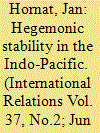

|
|
|
|
|
| Summary/Abstract |
The United States has improved relations with no other country during the Trump administration as much as it advanced its relationship with India. US-India relations have arguably marked their historical high points since Trump entered office and India seems to be overcoming its suspicion of closer cooperation with the US. Given these developments, this article aims to theorize the relationship through the hegemonic stability theory and explain US strategy toward India. We first demonstrate why India is accepting the hegemonic standing of the US in the Indo-Pacific and then – since balance of power politics are still a staple of policymakers’ approach to stability in the Indo-Pacific – we introduce the notion of induced balancing to show what approach the United States has adopted to empower India to expand its balancing capacity vis-à-vis China. The last section of the article empirically maps the various incentives that Washington offers to New Delhi in order to situate it in the desired position of a proxy China-balancer.
|
|
|
|
|
|
|
|
|
|
|
|
|
|
|
|
| 4 |
ID:
191957


|
|
|
|
|
| Summary/Abstract |
This article argues that contemporary debates around intervention, and especially humanitarian intervention, have misunderstood the meaning of these concepts in Cold War international society. By comparing a specific kind of humanitarian interventionism with a specific kind of internationalism, that of a revolutionist strain of Third World practice, it shows that existing studies have paid too little attention to discursive entanglements of coercion, self-determination, and humanitarianism. The Angola case provides a significant illustration: in 1975 the problem of intervention comes to be tied not just to dictatorial interference, but to a logic of self-determination, which is itself tied to causes of anticolonialism and anti-racism. It is too easy to say that the period’s rules of non-intervention precluded the legitimate coercive prevention of atrocities and related international crimes. Particular practices of internationalism, linked to the promotion of self-determination, provided a basis for enforcing international human rights treaties, including the Genocide Convention. All this seems very different from what we usually know of the legitimacy of saving strangers and the character of Third World organising in the mid-20th century.
|
|
|
|
|
|
|
|
|
|
|
|
|
|
|
|
| 5 |
ID:
191959
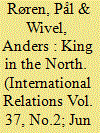

|
|
|
|
|
| Summary/Abstract |
The Scandinavian states’ pursuit of status in world politics is well documented. However, little is known about whether these endeavors have resulted in higher status for these states. In this article, we suggest that the Scandinavian countries represent a useful case to explore whether similar foreign policy profiles and common club membership equalizes or exacerbates the unequal distribution of status recognition in world politics. To measure the status recognition of Sweden, Denmark, and Norway, we use a network centrality measure of diplomatic representation and exchange from 1970 to 2010. We also measure how well the states have performed to increase their status recognition given their available status resources (measured by military capabilities and wealth) and their status-seeking effort (measured by relative diplomatic outreach). Our results show that Sweden has received significantly more recognition and performed much better than both Denmark and Norway in the measured period. We offer three explanations for these developments. First, the spoils of seeking status using the Scandinavian brand is akin to a regional zero-sum game in which Sweden, as the most visible state of the three, is the main beneficiary of the status recognition in the direction of the club. Second, status recognition often lags achievements or increases in status resources because the beliefs of foreign policy practitioners are only updated sporadically. This status lag is especially visible when states struggle to convert their resources into status (Norway), or when they succeed in maintaining their status despite experiencing a drop in status resources (Sweden). Third, an increase in status resources will only influence status recognition if it plays into a corresponding narrative. Sweden, in contrast to the nouveau riche Norwegians, has managed to rearticulate its foreign policy in a way that has attracted recognition in world politics.
|
|
|
|
|
|
|
|
|
|
|
|
|
|
|
|
| 6 |
ID:
191961
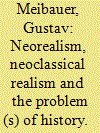

|
|
|
|
|
| Summary/Abstract |
Following scholarship on IR’s ‘historical turn’ as well as on neorealism and neoclassical realism, this article finds fault particularly in neorealism’s implicit reliance on the historically contingent but incompletely conceptualised transmission of systemic factors into state behaviour. Instead, it suggests that neoclassical realism (NCR) is well-suited to leveraging ‘history’ in systematic and general explanation. This article interrogates two routes towards a historically sensitive NCR (intervening variables and structural modifiers), and how they enable different operationalisations of ‘history’ as a sequence of events, cognitive tool or collective narrative. The first route suggests history underpins concepts and variables currently used by neoclassical realists. Here, history is more easily operationalised and allows a clearer view at learning and emulation processes. It is also more clearly scoped, and therefore less ‘costly’ in terms of paradigmatic distinctiveness. The second route, in which history modifies structural incentives and constraints, is more theoretically challenging especially in terms of differentiating NCR from constructivist approaches, but lends itself to theorising systemic change. Both routes provide fruitful avenues for realist theorising, can serve to emancipate NCR from neorealism in IR and foster cross-paradigmatic dialog. Examining how ‘history’ can be leveraged in realism allows interrogating how other ‘mainstream’, positivist approaches can and should leverage historical contingency, context and evidence to explain international processes and outcomes.
|
|
|
|
|
|
|
|
|
|
|
|
|
|
|
|
| 7 |
ID:
191956
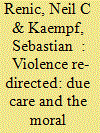

|
|
|
|
|
| Summary/Abstract |
In this article, we argue in favour of a conceptual expansion of the Just War idea of ‘due care’, to include the foreseeable, but indirect harm generated by Western force protection. This harm includes the phenomenon of ‘casualty displacement warfare’ – circumstances in which the prioritisation and relative success of Western force protection incentivises some Western adversaries to redirect more of their own violence away from Western soldiers and onto civilians. Primary moral responsibility for such violence should be allocated to those who violate the principle of non-combatant immunity, whatever their motivations. Critically though, we argue that Western militaries do bear some indirect culpability for the conflict conditions that structure such violence. These same militaries, we argue, are morally duty bound to do what they feasibly can to reduce the risks of casualty displacement, even if this necessitates a relaxation of their own commitment to force protection.
|
|
|
|
|
|
|
|
|
|
|
|
|
|
|
|
| 8 |
ID:
191962


|
|
|
|
|
| Summary/Abstract |
This review essay engages three texts focused on women who engaged with international thought in the early to mid-20th century. Women’s International Thought: A New History and Women’s International Thought: Towards a New Canon, both edited by Patricia Owens and her co-editors. The third, To Turn the Whole World Over: Black Women and Internationalism, edited by Keisha Blain and Tiffany Gill. A few women discussed in these texts are recognized today, most are completely forgotten. Some aspired to careers in the academy but encountered obstacles on account of their sex and/or race. Many were scholar activists who claimed that their writings should address real world problems. These texts foreground the work of African American scholars, focused on racism and imperialism, subjects that IR ignores. Since some were denied publication outlets many wrote journals and published in newspapers. Although previously ignored, all these women had important things to tell us about international relations.
|
|
|
|
|
|
|
|
|
|
|
|
|
|
|
|
|
|
|
|
|